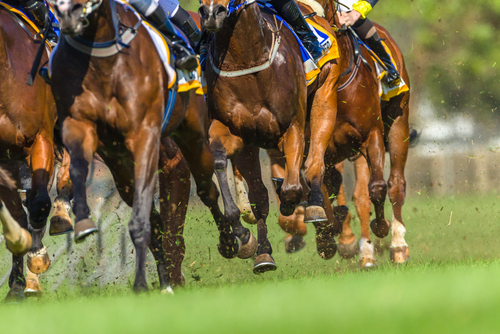A study carried out by the Royal Veterinary College (RVC) has identified 112 genes that are potentially linked to bone fracture risk in Thoroughbreds.
This discovery will support further research into genetic risk factors, help improve equine health and well-being and support the development of new interventions to reduce the risk of fractures in horses.
Thoroughbreds are susceptible to bone fractures in racing due to the extreme forces exerted through their bones during competition. It is estimated that 60 horses have to be euthanised at UK racecourses each year due to bone fractures.
The team of RVC researchers, which was led by Dr Debbie Guest, senior research fellow at the RVC, used a polygenic risk score model to assess fracture risk by using stem cells to make bone-forming cells from horses at both high and low risk.
Every gene that was expressed by the cells was measured to identify those with different expression levels in the bone cells from horses at higher versus those at lower risk.
‘A common problem’
“Bone fractures are a common problem in Thoroughbred racehorses, despite many changes to racecourses over the years to reduce environmental risk factors,” said Dr Guest.
“We know that fracture risk has a genetic component and we have previously developed a polygenic risk score for fracture to allow us to identify horses at increased risk.”
The study identified 112 genes that may be involved in fracture risk and demonstrated that many of these genes regulate the bone matrix. Many of the genes have never been studied in bone before and consequently more research must be taken to understand the function of these genes in bone cells and what their role in fracture risk is.
“In this study, we have identified many new genes which have altered expression in bone cells from high-risk horses. For some of these genes, we know that they play a role in regulating the bone matrix,” continued Dr Guest.
“We can now begin to develop a deeper understanding of how bone tissue is altered in high-risk horses and new interventions to reduce their risk.”
Research progression
This study forms part of a series of research which is exploring genetic mechanisms behind fracture risk.
A previous study found that collagen type III, a gene which is required for normal bone formation, is expressed at lower levels in bone cells from horses with a high genetic risk of fracture. This is caused by a change in their DNA sequence in the region which controls how much collagen III is produced.
The research was funded by the Horserace Betting Levy Board, the Anne Duchess of Westminster Charitable Trust and The Alborada Trust.
Image © Royal Veterinary College.
Further reading
- 7 ways to enrich your horse’s environment
- Swap birch for padded hurdles in interest of racehorse welfare, say researchers
- New scheme will provide expert tuition to riders on former racehorses
- How to take care of a horse
- Horse welfare and being environmentally friendly are intrinsically linked, say experts








